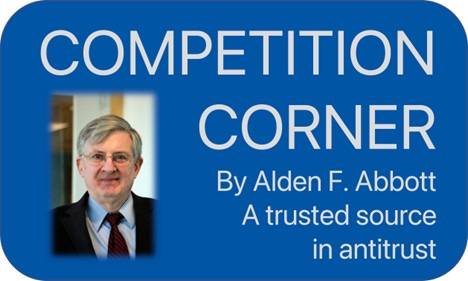Dear Readers,
Some of you may have heard that Twitter is shutting down Revue, its newsletter platform service. Some of you may have never heard of Revue. Nonetheless, as that is the service we previously used for the Competition Corner, we are now switching to Substack. I hope you will enjoy uninterrupted insights from myself and my colleagues as we continue to follow antitrust policy in this new year of transition!
In this issue, I start by promoting the Mercatus Center’s 2nd Annual Antitrust Forum. See links below to see our incredible lineup of speakers and register to attend. Hope to see you there! I also lead off the article roundup with my latest commentary on the FTC’s NPRM on noncompete clauses. Is the FTC headed for institutional crisis?
Mercatus Center’s 2nd Annual Antitrust Forum: Policy in Transition
During the past year, antitrust policy has been in a state of tension. Enforcers on both sides of the Atlantic are lending support to a more interventionist regime filled with rules, regulations, and interventions. Fortunately, however, courts appear to be holding firm to an antitrust policy centered on consumer welfare enhancement that has, by and large, held sway over the last four decades. Furthermore, while new ex ante competition regulation has been formally adopted in the EU (the Digital Markets Act), Congress wisely elected not to enact antitrust legislation that would have spawned business confusion and ushered in new forms of costly regulatory oversight of the private sector, in the guise of “antitrust reform.”
So let’s count our blessings. My wish for next year is that the Biden Administration takes seriously the procompetitive “all of government” reform message of the 2021 Executive Order on Competition, and turns its focus to cost-benefit-based regulatory reform and empirically-based economically sound antitrust enforcement, centered on the consumer welfare principle.
On January 26, 2023, the Mercatus Center will host its 2nd annual antitrust forum at George Mason University. Sign up today to reserve your spot at the antitrust event you won’t want to miss, and stay tuned for a policy brief outlining the developments in antitrust policy during 2022.
View the schedule and register here: https://www.mercatus.org/events/2023/01/mercatus-centers-2nd-annual-antitrust-forum-policy-transition
Recent Articles
The FTC’s NPRM on Noncompete Clauses: Flirting with Institutional Crisis | Truth on the Market
by Alden Abbott
The Federal Trade Commission’s (FTC) Jan. 5 “Notice of Proposed Rulemaking on Non-Compete Clauses” (NPRMNCC) is the first substantive FTC Act Section 6(g) “unfair methods of competition” rulemaking initiative following the release of the FTC’s November 2022 Section 5 Unfair Methods of Competition Policy Statement. Any final rule based on the NPRMNCC stands virtually no chance of survival before the courts. What’s more, this FTC initiative also threatens to have a major negative economic-policy impact. It also poses an institutional threat to the Commission itself. Accordingly, the NPRMNCC should be withdrawn, or as a “second worst” option, substantially pared back and recast.
The Case for Continued Light-Touch Regulation of Freight Railroads | Mercatus Center
by Tracy Miller
Railroads play an important role in the US freight transportation system, but most markets are connected by no more than two railroads and some only by one. Mercatus scholar Tracy Miller, in a recently released research paper, outlines how current light-touch regulations have increased the efficiency of railroads, and how small changes in government policy could promote competition between railroads without interfering with their ability to earn enough profits to invest and improve service.
The FTC Power Grab | Real Clear Policy
by Gregory Werden
At the urging of big business opponents, President Biden appointed Lina M. Khan, an advocate for greater government control over the economy, to chair the Federal Trade Commission. The FTC has now declared that the agency has, and will exercise, extraordinary powers that it never before asserted. In a recent commentary for Real Clear Policy, Visiting Fellow Gregory Werden outlines the recent consolidation of power and potential administrative overreach of the Federal Trade Commission that may come about in the next few years.
The IP News that Mattered Most in 2022, According to You | IP Watchdog
Here we are again at the end of a year—this one the first in several where courts and business proceeded mostly as usual and relatively free of shutdowns and delays due to the pandemic. Below, some of our readers weigh in on what IP news mattered most to them in 2022.
Patent Pools, Innovation, and Antitrust Policy | Truth on the Market
by Alden Abbott
Late last month, 25 former judges and government officials, legal academics and economists who are experts in antitrust and intellectual property law submitted a letter to Assistant Attorney General Jonathan Kanter in support of the U.S. Justice Department’s July 2020 Avanci business-review letter (ABRL) dealing with patent pools. The ABRL, in line with other business review letters issued over the last 25 years, promotes greater certainty regarding the antitrust treatment of pools. In a commentary for Truth on the Market, I outline why a DOJ decision to reconsider (in other words, to withdraw) the sound guidance embodied in the ABRL would detract from this certainty and thereby threaten to undermine innovation promoted by patent pools.






